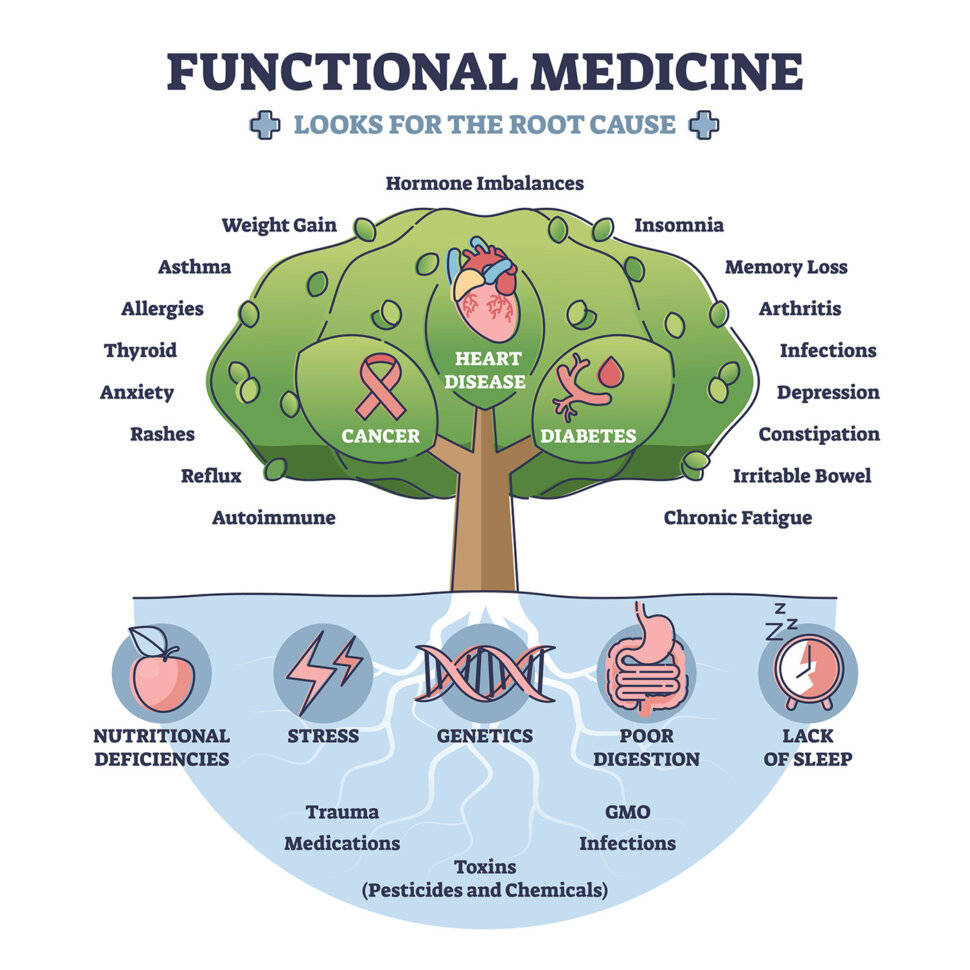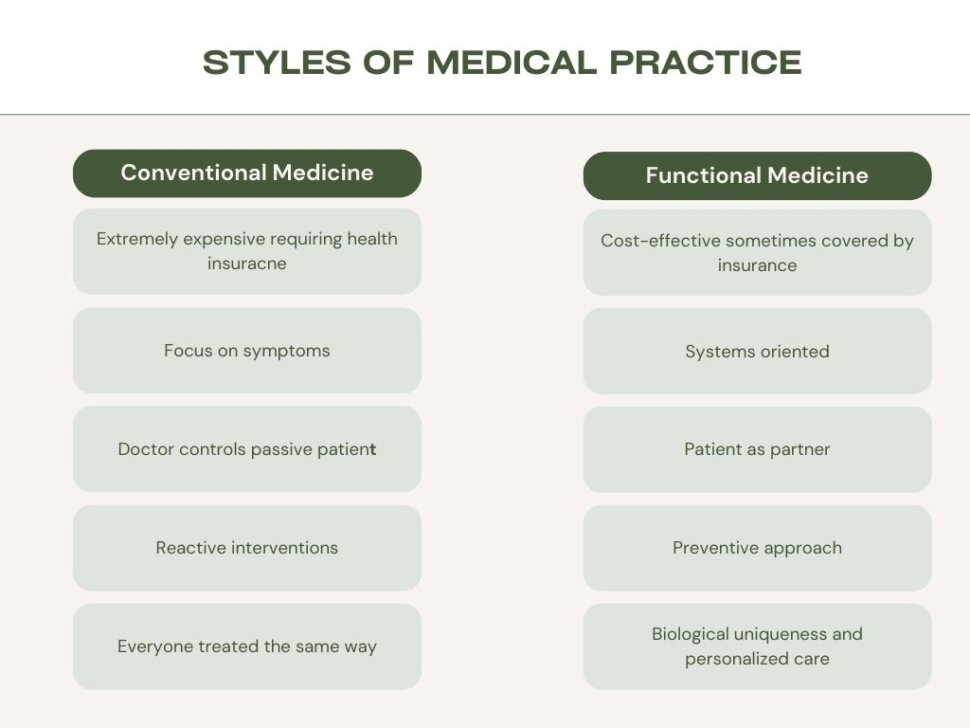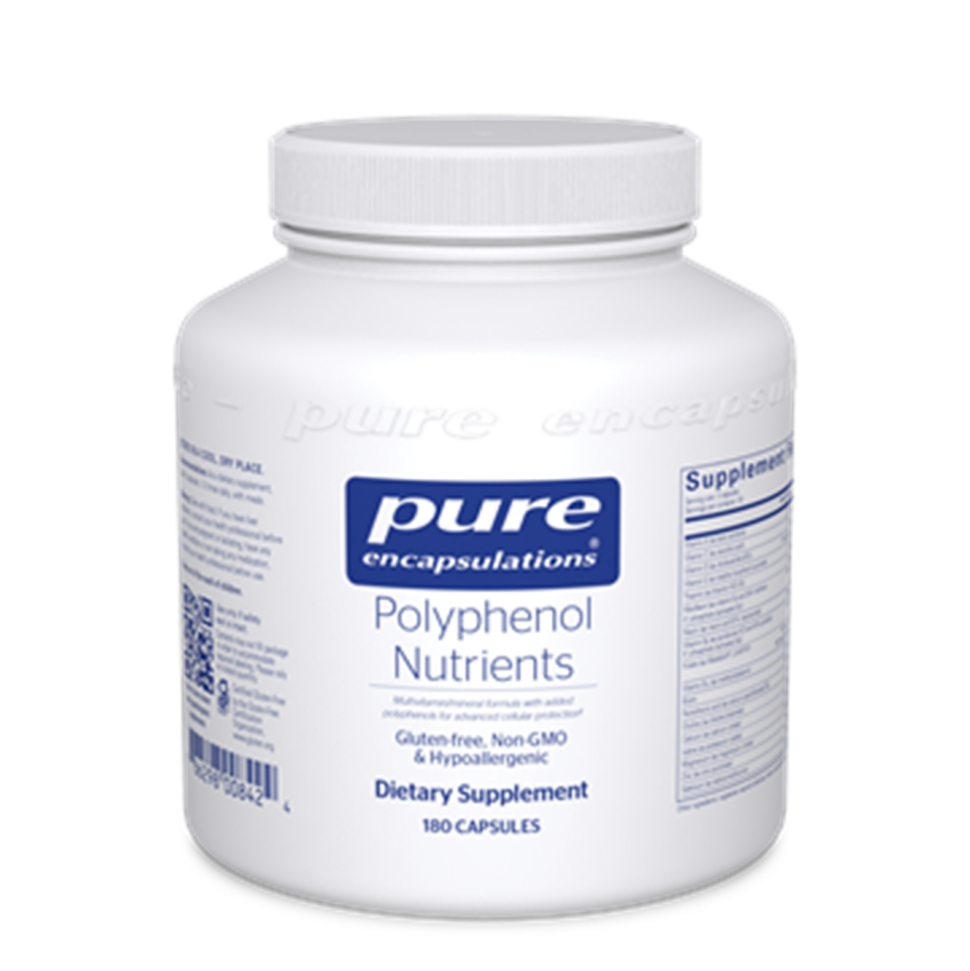Unlocking The Power of Functional Medicine
| | Reading Time: 7 minutes

Discover the Importance of Functional Medicine: A Guide to Personalized Healthcare and Root Cause Analysis
As more patients seek help with complex chronic health conditions and for optimal aging, functional medicine—once considered an “alternative medicine” fad—is now a highly sought-after form of medical care. This guide will explain the value of functional medicine and help you find the right doctor for your health journey.
What Is Functional Medicine?
Functional medicine takes a personalized approach to diagnosing and treating chronic diseases. Diet, exercise, lifestyle, and nutritional supplements are the main treatments for this approach.
When patients go to a functional medicine doctor, they may get conventional diagnostics, like MRIs and blood tests, and unconventional ones, like muscle testing, also called applied kinesiology or acupuncture meridian analysis. A cornerstone of functional medicine is specialized clinical tests, including blood testing for food sensitivities, gut microbiome screening, genetic tests like cytochrome P450 (our primary defense against environmental chemicals), and immunological screening for chronic viral infections.
Treatment for chronic, complex conditions requires a personalized care model. Each patient’s experiences are unique but have detectable variations or deviations from health that your doctor uses to design your personalized program. Customized data points found on clinical tests are invaluable for the individual patient. But so are lifestyle, including sleep quality and duration, and emotional stressors. Additional markers like heart rate, blood oxygen levels, blood sugar, blood pressure, body composition, blood chemistry, hormone levels, and chronic inflammation markers help to guide treatment. Functional medicine integrates biometrics, bioinformatics, and traditional clinical research models to assess a patient’s metabolic, cognitive, and immunological status. It looks at the body as a whole—including lifestyle, diet, optimal nutrient levels, immune status, and mental-emotional well-being. It’s more specific than the holistic medicine of previous decades.
It’s a type of “network” medicine addressing physiologic disruption in underlying body system networks like detoxification or immunity. Functional medicine is also known as evidence-based natural healthcare or root cause medicine.

What Conditions Are Best Treated with Functional Medicine?
Functional medicine is ideally suited for chronic, complex ailments. Chronic diseases occur as clusters of dysfunctions. For example, in functional medicine, type 2 diabetes is not a single disease target treated by one drug. It’s one of four different subtypes, each with unique variations in metabolism. Functional medical treatment matches treatment to the type (Diabetes 1-4) and the individual needs of each patient to restore their body’s ability to manage blood sugar permanently.
Conditions Frequently Treated by Functional Medicine Practices:
- Food sensitivities and chemical intolerance
- Blood sugar disorders like hypoglycemia and type 2 diabetes
- Multiple allergies, both environmental and chemical
- Chronic fatigue syndrome
- Low immune function
- Functional gastrointestinal disorders like irritable bowel syndrome (IBS)
- Sleep disorders
- Autoimmune disorders like Hashimoto’s disease
- Chronic viral disorders, including Epstein Barr Virus and Long COVID caused by SARS-CoV-2
How Does Functional Medicine Compare to Conventional Healthcare?
Functional medicine differs from conventional medicine in several ways. The fundamental difference is that the pharmaceutical industry does not drive it. Functional medicine physicians may prescribe pharmaceutical drugs but aim to restore health and return patients to normal function without drugs. When possible, the goal is to find a cure, but that can be difficult, so the second-best is drug-free management for chronic conditions.
One of the main differences is how long a doctor spends with a patient. In conventional medicine, a primary healthcare provider focuses on a quick, usually less than 15-minute, office visit matching a patient’s symptoms with a pharmaceutical prescription. If you have six symptoms, you may get six drugs over several short visits.
An initial visit with a functional medicine physician is typically 60-90 minutes. Follow-up visits last 30 minutes. And there’s a continuity between visits over time with a goal of the least number of prescription drugs needed for each patient. Treatment includes a healthy diet and lifestyle, treating nutrient deficiencies, managing physiological aberration with nutritional supplements, and practices like acupuncture. Emphasis is on cure when possible.

Doctors need specialized training to be skilled in functional medicine. The Institute for Functional Medicine is the leading organization for this training. Naturopathic doctors (NDs) receive functional medicine training during their medical education.
Four Elements of Functional Medicine:
- Diagnosis focuses on the cause of an illness rather than symptoms.
- An evidence-based approach merges science with clinical practice.
- Involves a multidisciplinary approach.
- Functional medicine fosters a physician-patient partnership.
A functional medicine practitioner knows that most chronic diseases are caused by diet, stress, and genetics. In addition, many conditions are due to underlying imbalances in body functions, like female hormone decline in menopause or low testosterone in older men. They recognize the importance of a healthy gut microbiome. They know the post-industrial world contains high levels of toxic environmental chemicals that disrupt health, like mercury and pesticide residual. And they factor in the long-term results of past infections like Lyme Disease and Epstein Barr Virus as a cause for chronic fatigue syndrome, or SARS-CoV-2 in Long COVID. Mold exposure is another cause of many chronic conditions. Functional medicine doctors are well-versed in these modern illnesses.
Why it is Ideally Suited for Healthy Aging?
Although lifestyle is the foundation for health, sometimes it’s not enough to reverse longstanding diseases. Lifestyle-based therapies like specialized dietary choices, including more polyphenol-rich foods like blueberries and olives, are starting points. But as we age, chronic diseases add up.
Over 50 percent of adults have at least one chronic health disorder, and half have more than two conditions. Many of my patients have more than five chronic conditions, each with several symptoms.
Chronic disease accounts for more than 86 percent of healthcare costs. And this is compounded by adverse drug reactions and interactions between multiple medications. My patients often have symptoms caused by their condition, plus medication reactions.
When I started practicing forty years ago, non-conventional therapies were called alternative medicine. These included acupuncture, herbal medicine, fasting, nutrition supplements, and Eastern physical exercises like Taiji. Now, all these practices fall under the umbrella of functional medicine.
How Can I Find a Functional Medicine Doctor?
A trusted referral, like a friend or family member who gets functional medical care, as primary or supplemental to conventional medicine, is a great way to get introduced to a functional medicine doctor. The Institute for Functional Medicine provides a search box to the largest referral network in functional medicine. To get an idea of a practitioner’s clinical philosophy, review the websites and publications of healthcare providers.
Types of Functional Medicine Doctors:
- DC – Doctor of Chiropractic with advanced training.
- DO – Doctor of Osteopathy with advanced training.
- MD – Medical Doctor with advanced training.
- ND – Naturopathic Doctors are professionally trained in functional medicine.
- OMD/DAOM – Doctors of Acupuncture and Oriental Medicine with advanced training.
Prevention Is Better Than Treatment
No one can avoid all illnesses and accidents over a lifetime. But we can improve our chances of staying well and improve our outcome should we get sick by using functional medicine therapies. Besides a healthy lifestyle, including a whole foods diet, Dr. Williams recommends a daily supplement stack for health enhancement and chronic disease prevention. The cornerstone is a multivitamin and mineral with polyphenols, including blueberry and pomegranate extracts and green tea catechins.
What Is a Supplement Stack?
Dr. Williams’ Daily Supplement Stack
- Polyphenol Nutrients – Enhanced antioxidant support multivitamin/mineral formula. Take 1-2 capsules twice daily with meals.
- Methyl-Guard – Methylation support nutrients to maintain homocysteine metabolism important for chronic disease prevention and healthy aging.
- Mushroom Emperors – A balanced formula of 14 medicinal mushrooms. Take two tablets twice daily between meals.
- Daily Probiotic – Take one capsule of Thorne’s Women’s Daily probiotic for women. For men, take FloraMend Prime Probiotic.
- Protein Powder – Whey protein is preferred, but those with dairy intolerance can take pea or rice protein. Mix one scoop in water, oat, or nut milk and drink once daily. For those with dairy sensitivity, use pea protein isolate like from Seeking Health.
- Vitamin D3 – Vitamin D supports healthy bones and immunity. It’s universally deficient in the modern diet, even in healthier diets. Start with one daily, then get your vitamin D 25-hydroxy level tested in a few months to ensure you’re getting enough. Order your test online without a prescription.








I know you can be healthy lifelong. I’ve experienced the benefits of functional medicine and seen it in my patients and proactive individuals. A starting point is taking professional quality supplements that support healthy gene expression, like my supplement stack.
FAQs Functional Medicine
What Is functional medicine?
Does functional medicine use blood testing?
Is functional medicine useful for healthy aging?
Is functional medicine effective?
Can you do functional medicine healthcare on your own?
About Dr. Williams
Functional medicine is challenging to practice. Like any medical specialty, developing safe and efficient clinical skills takes years to experience. With 40 years of clinical practice and over 100,000 patient visits, Dr. Williams has devoted his career to functional medicine. He offers patients a range of treatments and testing, including for autoimmune disorders like Hashimoto’s disease and Multiple Sclerosis, Chronic Fatigue (ME/CFS), and Long COVID. With six books, including Viral Immunity, and numerous peer-reviewed academic papers. He is on the editorial review board for Current Traditional Therapies. And he teaches at Emperor’s College in Los Angeles.


